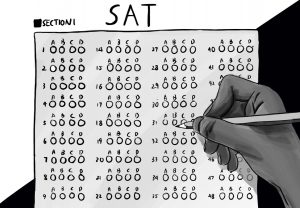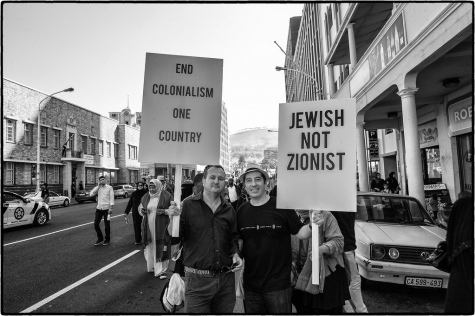My Struggle for Intellectual Honesty: Homosexuality and Torah
Eli West discusses the Torah’s perspective on homosexuality. In this blog he writes about his personal experience.
February 3, 2023
וְאֶת־זָכָר לֹא תִשְׁכַּב מִשְׁכְּבֵי אִשָּׁה תּוֹעֵבָה הִוא׃
Do not lie with a male as one lies with a woman; it is an abhorrence. -Leviticus 18:22
Shabbat, or Shabbos, marks the seventh day of creation, the rest day, and takes place from sundown on Friday to sunset on Saturday. Growing up, Shabbos meant a time for family, my mom’s matzo ball soup, and general laziness. However, over the past few years, I’ve come to view Shabbos in a wholly different light: now, it’s a time to step back, breathe, and reflect on all I’ve accomplished over the week. There is a special place in my heart for this break in time.
But last spring, something happened, something I haven’t let myself think about until now. For context, each Saturday morning during shacharit (the morning service), Jews read a passage from the Torah called a parshah, and because I couldn’t make it to services this particular morning, I listened to a podcast on the story instead. “Welcome to Parshat Acharei Mot,” said the rabbi. The podcast continued until I heard him exclaim, “do not lie with a male as one lies with a woman; it is an abhorrence.” My body froze. I cannot describe how it feels to hear these words recited in my Torah; a book I have an enormous amount of love for, a book written by Hashem Himself, and a book from which I seek to live my life by. It was a gut punch that any gay or bisexual religious Jewish kid, whether open with their identity or struggling with it, has felt before. Typically, I attend shacharit, listen to the parshah, and later try to read some sort of rabbinical commentary on the portion. However, that week, I turned off the podcast and left Shabbos behind. Several months later, though, I’m applying to a yeshiva in Jerusalem after Masters, so I think it’s time I confront Parshat Acharei Mot again.
וְאִישׁ אֲשֶׁר יִשְׁכַּב אֶת־זָכָר מִשְׁכְּבֵי אִשָּׁה תּוֹעֵבָה עָשׂוּ שְׁנֵיהֶם מוֹת יוּמָתוּ דְּמֵיהֶם בָּם׃
If a man lies with a male as one lies with a woman, the two of them have done an abhorrent thing; they shall be put to death—and they retain the blood guilt. -Leviticus 20:13
First, let’s take a look at what the Gemara, a book that comprises part of the Talmud (oral commentary on the Torah), says about homosexuality. Yevamot 54b in the Gemara, an ancient Jewish text, suggests that ha’arah, the initial stages of intercourse, is enough for both men to be liable for homosexuality. Nevertheless, with this specific passage, one must ask, “what is ha’arah?” Rabbi Shmuel says it is contact with the external organs often associated with sex, whereas Rabbi Yochanan says it is the moment anal sex begins.
When coupled with extensive Jewish legal writing about homosexuality, many contemporary Jewish scholars today hold the idea that the Torah only forbids anal sex between men. At the same time, the classical rabbinic view believes that most sexual intimacy between men is wrong. However, it’s unclear whether this is correct, and most halakhic legal scholars disagree with this assertion. Clearly, there’s been a lot of debate on the matter.
Rabbi Yehuda, part of the Chazal and editor of the Mishnah, noted in Masechet Kiddushin 82a that “Jews are not suspected of [engaging] in homosexual intercourse,” meaning that in his time, two Jewish men could, in fact, be together, as these tendencies were seen as innate. Rav Yehuda might seem surprisingly neutral towards homosexuality, yet I still cannot accept his claim.
`Did he forget that a ban on homosexuality is included in the sheva mitzvot b’nei Noach, or the “Seven Noahide Laws,” which were given to Noah by Hashem and supposedly bind all of humanity? Because Rav Yehuda’s argument is qualified with the word “Jews,” he implies that gentiles may still be suspected of homosexuality. This leaves me asking: if gentiles are suspected of homosexuality but cannot act upon it, then how could it ever be possible for gay Jews to act upon their urges?
Today, some scholars claim that because we know homosexuality is not a choice, this halakhic prohibition does not apply to LGBTQ Jews in our era. Despite the fact that I am not the most well-versed in Torah (yet), I find their logic fairly arrogant. Has the nature of human beings grown that drastically in 2,000 years? I mean, I just can’t accept the idea that we have changed that much, especially our uncontrollable primitive behavior regarding sex.
While there is much more I could delve into, I honestly get the halakhic view on homosexuality. It may be uncomfortable to admit, but I don’t find anything about this prohibition puzzling. Specifically in the context of Parshat Acharei Mot, what Judaism is trying to bring into the world makes complete sense to me. Intense rabbinical debates aside, some suggest that “wasting seed” is the reason for a ban on homosexuality, but that simply does not make sense to me. Sexual expressions are encouraged in Judaism, and in the context of kiddushin, marriage is necessary to elevate one’s neshama–one’s soul–closer to Hashem. Even outside of procreation is sex within kiddushin sanctified. Yet, Judaism offers no pathway for gay Jews to sanctify their urges.
So yes, in my view, homosexuality is not the ideal way sexuality should manifest itself, and it takes a great deal to admit that. But here I am–a liberal gay student who wants nothing more than to find a halachic basis for having a husband and raising a family when I am older while maintaining intellectual honesty at the same time. Despite all of this, I believe deeply that Hashem is my Divine Author–that I am who I am because of Him. If each of us is created in Hashem’s image, there must be some reason why He chose me to be gay.
At this point, I could easily turn away from Torah and religion entirely. Nonetheless, I feel strongly that Parshat Acharei Mot doesn’t exist to foster hatred of Judaism in gay Jews or hatred of LGBTQ people in straight Jews. I challenge everyone to use Acharei Mot as a reminder that life on earth is nuanced and that no situation is ever black or white. Like Judaism, almost every institution, whether it’s our family, religion, or schools, can present us with contradictory values that may make us uncomfortable or angry. Regardless, it’s imperative that we “zoom out” and try to see the world for all its parts. Ultimately, these situations make us ethical leaders, students, and citizens, and I know having the ability to do so can craft us all into powers for good in the world.

Torah’s perspective on homosexuality. In this blog he writes about his personal experience. (Jenny ChingLui)



















